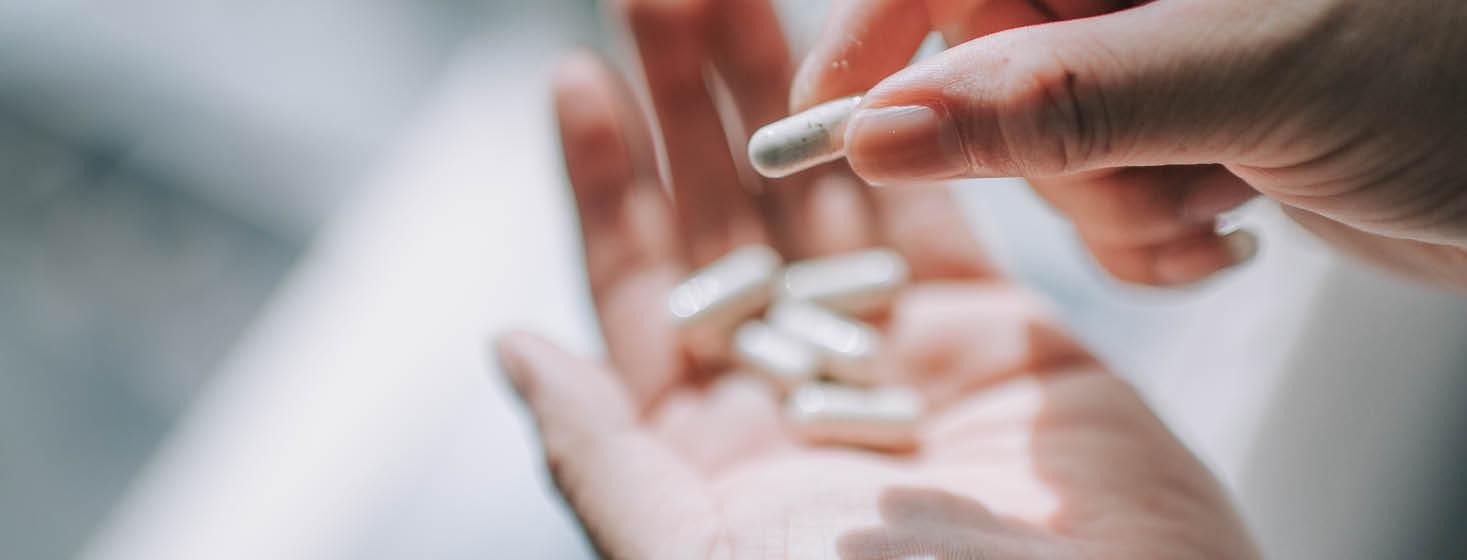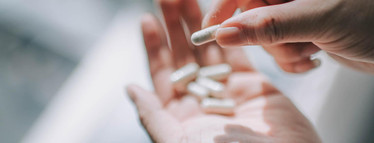
Our intestines get colonised with microorganisms straight after birth. From then on we live in a biologically significant, symbiotic relationship with these. This means that we both benefit from each other’s existence. There are far more bacteria in our gut than cells in our body. A lot more!
To gain a proper appreciation of the sheer volume of bacteria living inside our gut, we can do a little thought experiment and take them out of our gut and place them on a scale, here they would weigh in at roughly the same weight as our brain!
Literally translated, the term probiotics means “for” or “in favour” of “life” (taken from Latin ‘pro’ and Greek ‘biotic’) – when derived directly from the Greek word “biotikos,” it can also be translated to mean “of this life.”
Bearing in mind the trillions of microorganisms populating our gut, helping to contribute to our daily needs (in terms of immune system health, curbing inflammation and aiding in the digestion and assimilation of various foods), both translations appear fairly accurate.
The more than 500 different species of bacteria that live in our gastrointestinal tract all have varying functions – and scientists are now trying to identify exactly what tasks the differing strains perform so as to harness these findings therapeutically.
Microorganisms outnumber human cells in a ratio of 10:1. That means for every one human cell (say a red blood cell for example), there are 10 foreign cells that co-habitat the same space!
The lining of our intestines has more surface area than our skin and as such, is the largest interface between our body and the outside world. In that sense it’s not really surprising that our gut is home to so many microorganisms.
A more comprehensive look at our gut
To better understand how these foreign microbial cells interact with human cells, the National Institutes of Health (NIH) in the US launched the Human Microbiome Project (HMP) in 2007, as an offshoot to the Human Genome Project which famously isolated and analysed the first complete gene profile of a human being back in the year 2000.
What startled most back then was how few genes were actually present in human beings – approximately 25 000 ‘active' genes (ones that code for proteins used in the human body) – as the initial estimates had predicted over 100 000!
As a comparison, the HMP has now discovered that there are upwards of 8 million ‘active’ microbial genes that interact with our body on a daily basis.
The amount of data generated in the last years regarding specific, beneficial bacterial strains has led to the development of the discipline of pharmabiotics (the study of pharmaceutical applications of probiotics). The focus of pharmabiotics is to harness all the data in order to create useful, proactive applications for probiotics in the future.
This genetic data is increasing at an exponential rate as more sophisticated technologies emerge. These technologies now enable scientists to visualise over 200 complete genomes within a 50 hour time frame. To put this into context, unraveling the first human genome took the better part of 10 years!
How do beneficial bacteria relate to Probiotics?
Beneficial bacteria make up a portion of all of the trillions of microorganisms that inhabit our gut. They have been with us since birth and vary according to our diet. In a nutshell, probiotics are a live microbial food supplement that may benefit its host by improving the intestinal microbial balance.
The World Health Organisation (WHO) defines probiotics as “live microorganisms, which, when administered in adequate amounts, confer a health benefit on the host.” The concept goes that increasing the number of beneficial bacteria will result in these outcompeting those bacteria which can do the body harm.
Currently the main bacterial genus types of probiotics are: Lactococcus, Lactobacillus, Streptococcus, Bacillus and Bifidobacterium.
Using Probiotics for Health: A Centuries old concept
That bacteria could confer some beneficial effects in the human body is not a new theory by any means. The Ancient Greeks hinted at it and over 100 years ago the Russian scientist Élie Metchnikoff theorised that eating certain microorganisms could potentially provide humans with health benefits. He came up with this idea after observing people in rural Bulgaria who seemed to outlive their wealthier European counterparts, despite living in an unwelcoming climate and in relative poverty.
He put this lifespan disparity down to the fact that the Bulgarians drank more fermented milk products and that this in turn somehow made them healthier due to the presence of Lactobacillus bacteria in the fermented milk products.
Metchnikoff later proved his hypothesis by showing that certain species of beneficial bacteria were capable of outcompeting harmful bacteria, and that this approach could be used to treat certain types of intestinal diseases. He received the Nobel Prize for Medicine in 1908 as a result of this work.
Diet affects bacterial population growth, rapidly
It is not surprising to discover that what we put into our mouths ultimately affects the population of bacteria that reside in our intestines. That seems fairly obvious. What we didn’t know, was how quickly the bacterial colonies could change due to a varying diet.
Previously scientists used mouse models to show how diet affected bacterial diversity in the gut. More recent scientific investigations have been dedicated to quantifying exactly what types of food affect which species of bacteria, in human beings.
In other words, what species of bacteria help us digest what types of food and vice versa, what types of food promote the growth of which different types of bacteria.
Last December a group of American researchers published findings from a small study that attempted to map directly what different food groups affected which bacteria. The people who participated in the study were switched to either a plant- or animal-based diet. The plant-diet cohort avoided animal products and the animal one consumed cheese, milk and meat. What the researchers discovered was that those who consumed animal products saw an increase in a particular strain of bacteria known as Bilophila wadsworthia – a strain that, in mouse models, was associated with an increase in inflammatory bowel disorders.
It is important to note that these investigations have only just begun in humans and that a lot more research needs to be performed before any comprehensive conclusions can be drawn. The mouse models have shown us that their diet directly affects bacterial populations in their gut. Needless to say, humans are not mice and as such we cannot extrapolate these findings until the equivalent studies have been performed in human subjects – and here it needs to be stressed that it is incredibly difficult to find people who are willing to switch their diets and adhere to these.
The researchers found that after changing diets, the turnaround time in altered bacterial populations, was about 4-5 days. This was a lot faster than initially predicted.
From an evolutionary perspective it makes sense as our ancestors presumably never had a consistent diet and as such their gut bacteria would have had to change rapidly in order to deal with the differing foods that presented themselves to the “hunter-gatherers” – from deer meat, to clovers to berries.
Why Probiotics can help
Scientists have mapped the exact molecular pathways by which probiotics contribute to decreasing inflammation, not only in the gut but also in the surrounding body. It appears that probiotic bacteria directly reduce certain pro-inflammatory mediators, which in turn lowers the risk of developing any of a number of chronic inflammatory diseases.
Our gut is home to nearly 70-80% of all immune cells in the body, on top of this the endocrine system in our intestines uses over 20 hormones and is home to nearly a billion nerve cells. The bacterial colonies in our gut play an important role in this elaborate intestinal detection and maintenance system and as such maintaining a healthy and balanced bacterial population in the gut will have a positive impact on all the tissues in our body.
Because of our changed diet and ‘modern’ lifestyle (coupled to stress, environmental factors such as pollution and the overuse of certain antibiotics) – the beneficial bacteria residing in our guts have suffered, which in turn has directly led to an increase in certain chronic inflammatory diseases.
Thankfully there are a range of probiotic supplements available today that can help sort out this imbalance.
We need these beneficial bacteria as they aid in the digestion of our food, help us manufacture various vitamins (particularly B-12 and K) and most importantly, keep disease-causing bacteria at bay by outcompeting them for nutrients and space in our gut. Certain strains have been proven to lower the risk of urinary tract infections and some vaginal infections (such as infection with Candida albicans).
The Future of Probiotics is Bright
Even though the concept of probiotics is not new to us humans (as the Ancient Greeks wrote about drinking fermented milk to treat diseases of the bowel 2000 years ago), the science of probiotics is only just beginning. Researchers are increasingly linking the presence of probiotics to treating a whole cornucopia of other conditions, including some neurobehavioural disorders such as depression, obsessive compulsive disorder and chronic fatigue syndrome. As a separate class of probiotic, these bacteria are termed “psychobiotics” and are capable of producing neuroactive substances such as gamma-aminobutyric acid (GABA) and serotonin, which once delivered, act on the brain-gut axis.
It is safe to say that when it comes to harnessing the healing potential of beneficial bacteria in our intestines, we are only at the tip of the iceberg in terms of discovering their hidden powers.
So, here’s to having little friends with great influence! The real future of probiotics is yet to be written – but one thing’s for certain, it’s looking bright – as if the sun were for once literally shining out of our gastrointestinal tracts!
by Christopher von Roy BSc, MSc, DCP Immunology
References
http://www.ncbi.nlm.nih.gov/pubmed/23759244
http://www.scientificamerican.com/article/the-guts-microbiome-changes-diet/
http://www.ncbi.nlm.nih.gov/pmc/articles/PMC2894525/
http://www.nature.com/nature/journal/vaop/ncurrent/full/nature12820.html
http://www.nature.com/nature/journal/v500/n7464/full/nature12506.html
http://onlinelibrary.wiley.com/doi/10.1111/jam.12459/abstract
https://www.genome.gov/27549400
http://www.livescience.com/28708-human-genome-project-anniversary.html
http://www.ncbi.nlm.nih.gov/pubmed/23361033
http://jac.oxfordjournals.org/content/58/2/266.full
http://iai.asm.org/content/76/8/3360.full
http://www.ncbi.nlm.nih.gov/pubmed/16827601
https://umm.edu/health/medical/altmed/condition/urinary-tract-infection-in-women
http://www.ncbi.nlm.nih.gov/pubmed/23759244
http://www.newscientist.com/article/mg22129530.400-psychobiotics-how-gut-bacteria-mess-with-your-mind.html
http://www.lef.org/magazine/mag2012/apr2012_Overlooked-Role-Probiotics-Human-Health_01.htm
We’d Love Your Feedback
Have you tried probiotic formulations before? If so, which kind and what were you treating? Thank you for sharing your experience with us.

